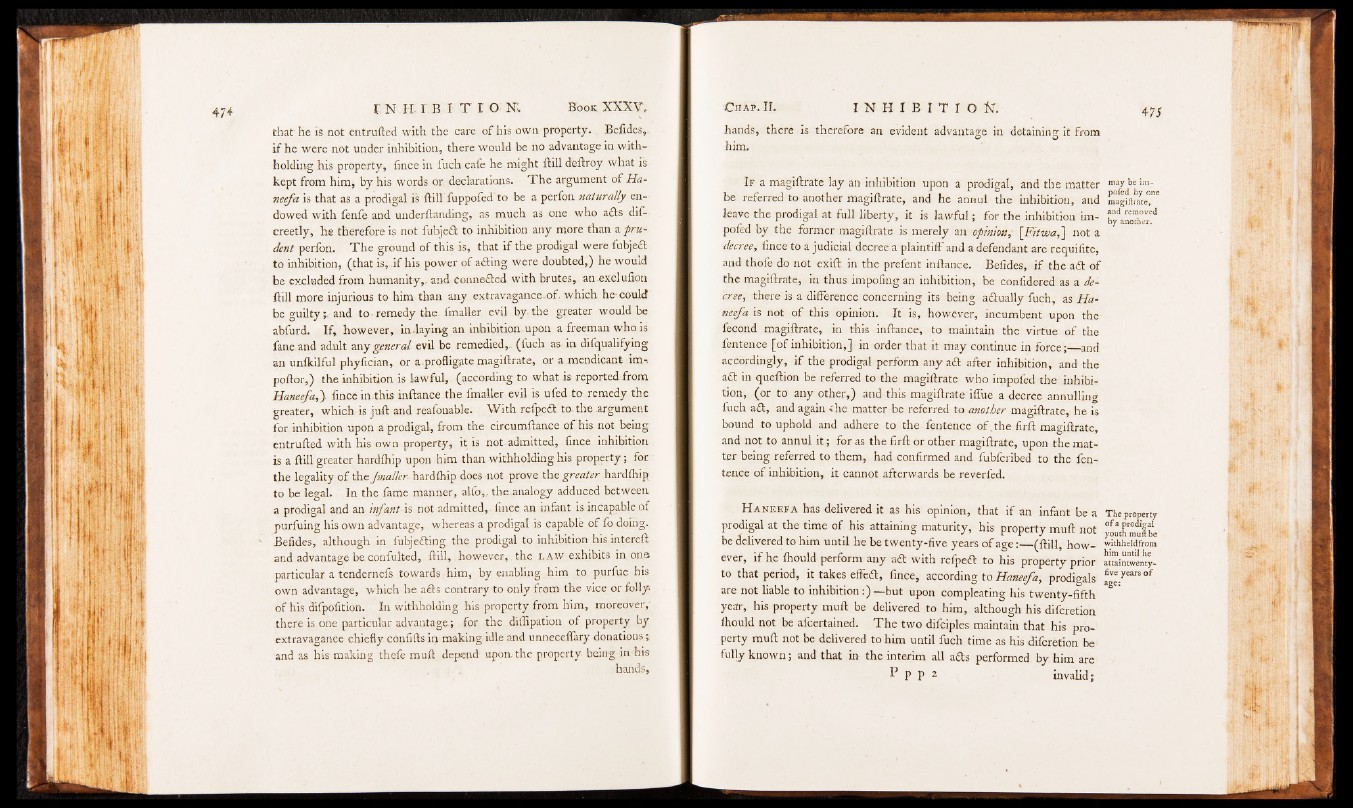
that He is not entrufted with the care o f his own property. Befides,.
i f he were not under inhibition, there would be no advantage in withholding
his property, fmce in fuch cafe he might ftill deftroy what is
kept from him, by his words on declarations. T h e argument of lia -
neefa is that as a prodigal is ftill fuppofed to be a perfon naturally endowed
with fenfe and underftanding, as much as one who adts dif-
creetly, he therefore is not fubjedt to inhibition any more than a prudent
perfon. T h e ground of this is, that if the prodigal were fubjedt
to inhibition, (that is; ,if his power of acting were doubted,) he would
be excluded from humanity,, and connedted with brutes, an-exclufion
ftill more injurious to him than any extravagance .of which he could
be guilty; and to. remedy the- l'maller evil by. the greater would be
abfurd. If, however, in.laying an inhibition upon a freeman who is
fane and adult any general evil be remedied, (fuch as in difqualifying
an unlkilful phyfician, or a.profligate magiftrate, or a mendicant im--
poftor,) the inhibition is lawful, (according to what is reported: from
Haneefa, ) fincein.this inftance the fmaller evil is ufed to-remedy the
greater, which is juft and reafouable. With refpedt to-the argument
for inhibition upon a prodigal, from the circumftance of his not being
entrufted with his own property, it is not-admitted, fince inhibition
is a ftill greater hardfhip upon him than withholding his property; for
the legality of the fmaller- hardfhip does not prove the greater hardftiip
to be legal. In the fame manner, alio,, the.analogy adduced between
a prodigal and an infant is not admitted, fince an infant is incapable of
purfuing his own advantage, whereas a prodigal is capable of fo doing.
Befides, although in fubjecting the prodigal to inhibition his intereft
and advantage be.confulted, ftill,. however,. the l a w exhibits in one
particular a tendernefs towards him, by enabling him to purfue his
own advantage, which he afts contrary to only from the vice or folly
of his difpofition. In withholding his property from him, moreover,
there is one particular advantage.; for the diflipation of property by
extravagance chiefly confifts in making idle and unneceflary donations;
and as his making thefe muft depend1 upon the property being in his
hands,
hands, there is therefore an evident advantage in detaining it from
him.
If a magiftrate lay an inhibition upon a prodigal, and the matter may be im-
be referred to another magiftrate, and he annul the inhibition, and magiftJL'T'
leave the prodigal at full liberty, it is lawful ; for the inhibition im- b^anoTh0^
pofed by the former magiftrate is merely an opinion, [Fitwa,] not a
decree, fince to a judicial decree a plaintiff and a defendant are requifite,
and thofe do not exift in the prefent inftance. Befides, i f the aft of
the magiftrate, in thus impofing an inhibition, be confidered as a decree,
there is a difference concerning its being actually fuch, as Haneefa
is not of this opinion. It is, however, incumbent upon the
fecond magiftrate, in this inftance, to maintain the virtue of the
fentence [of inhibition,] in order that it may continue in f o r c e a n d
accordingly, if the prodigal perform any ad after inhibition, and the
adt in queftion be referred to the magiftrate who impofed the inhibition,
(or to' any other,) and this magiftrate iffue a decree annulling
fuch aft, and again the matter be referred to another magiftrate, he is
bound to uphold and adhere to the fentence of,the firft magiftrate,
and not to annul i t ; for as the firft or other magiftrate, upon the matter
being referred to them, had confirmed and fubferibed to the fentence
of inhibition, it cannot afterwards be reverfed.
H aneefa has delivered it as his opinion, that if an infant be a T h e property
prodigal at the time of his attaining maturity, his property muft not "oathmSe
be delivered to him until he be twenty-five years of age:_(ftill, how- withheidfrom
ever, if he fhould perform any aft with refpedt to his property prior ataintwe^y-
to that period, it takes effedt, fince, according to Haneefa, prodigals *v^ ear5of
are not liable to inhibition:)— but upon compleating his twenty-fifth
year, his property muft be delivered to him, although his diferetion
fhould not be afeertained. T h e two difciples maintain that his property
muft not be delivered to him until fuch time as his diferetion be
fully known; and that in the interim all adts performed by him are
p P P 2 invalid;